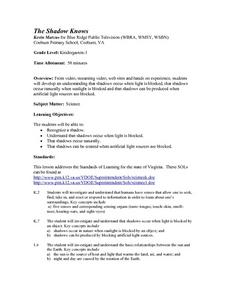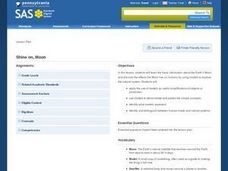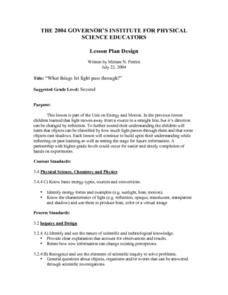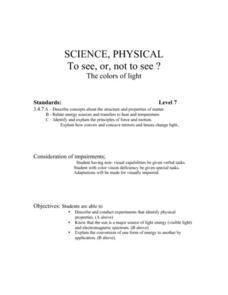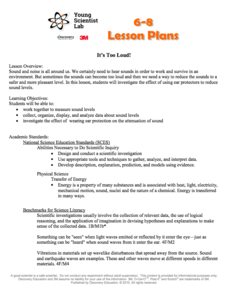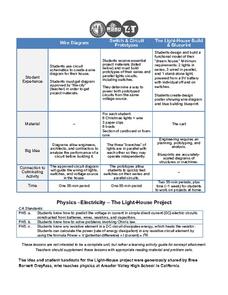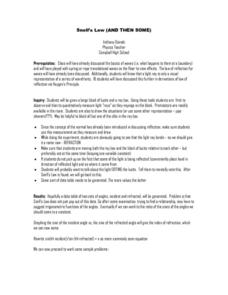Serendip
Where Does a Plant's Mass Come From?
Where does the mass for a growing tree come from? Scholars consider a few different hypotheses and guess which is correct. They then analyze data from different experiments to understand which concepts science supports.
Curated OER
Heating and Cooling a Really Large Lizard
Remind your middle school scientists how fox ear size varies depending on the climate they live in; large ears allow heat loss while small ears keep heat in. Discuss how a cold-blooded animal might try to regulate body temperature. Then...
Discovery Education
Cushion It!
Sugar cubes, collide! Groups design protection systems using bubble wrap to protect sugar cubes from being destroyed by falling batteries in the STEM lesson. They consider how the experiment relates to collisions in real-world...
Science Matters
Motors
It's time to get moving! The 13th lesson in a 14-part unit on electricity and magnetism explores the relationship between electricity and mechanical energy. Budding scientists build motors and experiment with different components to...
Curated OER
Photo Synthesis and Transpiration
Students germinate pea seeds and plant the seeds. They experiment with different amounts of light and darkness on the plant growth.
Curated OER
The Shadow Knows - Creating Shadows
Young learners recognize a shadow and witness how shadows occur when light is blocked. They access streamed video, standard video, and websites in order to engage in their study of how light is naturally blocked to create shadows. An...
Curated OER
Battery fun
Conduct an experiment with batteries to make a simple circuit. Fifth graders read the provided information, consider the two circuits, and determine which one is complete. An electrically charged experiment suggestion is included. Tip:...
Curated OER
What Are You Eating?
Discover the calorie content of foods by observing how much heat they produce in water. If you have a calculator-based laboratory (CBL™) insturment for collecting data, then this laboratory worksheet will not need any changes. If...
Curated OER
Shine On, Moon
Students explore space science by conducting an experiment in class. In this Moon lesson, students define a list of space science vocabulary and read the book The Moon. Students utilize shoeboxes and string to conduct a sunlight...
Curated OER
Exploring Solar Beads
Learners discover solar energy beads and learn about ultraviolet light. In this solar energy instructional activity, students learn about solar energy beads, ultraviolet light, and UV radiation dangers. Learners experiment with the beads...
Curated OER
What things let Light Pass Through?
Second graders classify objects according to how well light can pass through them and predict how well objects will transmit light. They experiment with objects to verify predictions while collecting, recording, and interpreting data...
Curated OER
Help Wanted: A Lighting Engineer For Popular Rock Group
Students are assigned to groups, and determine each member's role in the group. They will design an experiment to determine a way to produce the three primary and five secondary colors. Students discuss color and mood. They listen to a...
Curated OER
To See or Not to See: The Colors of Light
Seventh graders describe and conduct an experiment that identifies the physical properties of light. They explore sources of visible light and an electromagnetic spectrum. Students explain the conversion of one form of energy to another.
Curated OER
You Light Up My Life
Third graders participate in various experiments involving light. They demonstrate how light travels in a straight line until it strikes an object. Students show ways that light can be reflected, refracted, and absorbed.
Curated OER
Labs from Chicago, Summer 1993: Calibrating the Sun's Light
Students experiment with the luminosity of the Sun's light. In this luminosity lesson, students participate in an experiment with luminosity of the sun and flashlights. They make filters and fiber optic sources.
Discovery Education
It's Too Loud!
STEM scholars investigate sound attenuation by conducting an experiment in which they compare the farthest distance that they can hear a sound with and without ear protection.
Teach Engineering
Quantum Dots and Colors
Introduce teams to quantum dot solutions with an activity that has them expose solutions to a blacklight, observe the colors, and take measurements. Groups graph the data and analyze the dependence between particle size and...
Trash For Teaching
The Light-House Project
Groups work together to design a lighthouse, from designing and drawing the wiring diagram, to creating prototypes of the switch and circuit, to envisioning and building a scale model along with a blueprint. By including different...
Curated OER
How Light Moves
Students study the movement of light. In this light lesson, students work in groups to participate in a light and shadow walk around their neighborhood. Students brainstorm rules for light movement and watch videos about light travel,...
Curated OER
Solar S'Mores
Students see that solar energy is the energy given off by the sun. They explain that when light energy is absorbed by objects it is changed to heat energy and that dark-colored objects absorb more light and store more heat from sunlight.
Curated OER
Solar S'Mores
Students investigate solar energy. In this solar energy lesson, students compare how heat is absorbed in light-colored objects and dark-colored objects by making S'mores.
Curated OER
Solar S’Mores
Students cook with the power of the sun. For this solar energy lesson, students explore solar cooking as they apply scientific principles to cook s'mores.
Curated OER
Let the Sunshine in
Pupils collect and analyze data to study wavelengths of visible light. They cover Styrofoam cups with three different colors of sun filtering products and shine a lamp directly on the cups. They determine the most effective filtering...
Curated OER
Snell's Law (And Then Some)
Students conduct an experiment to test Snell's Law using a block of lucite and a ray box. They measure the light rays as they impinge upon the block. Students are also asked to draw the situation of the lab or create a model of the...







